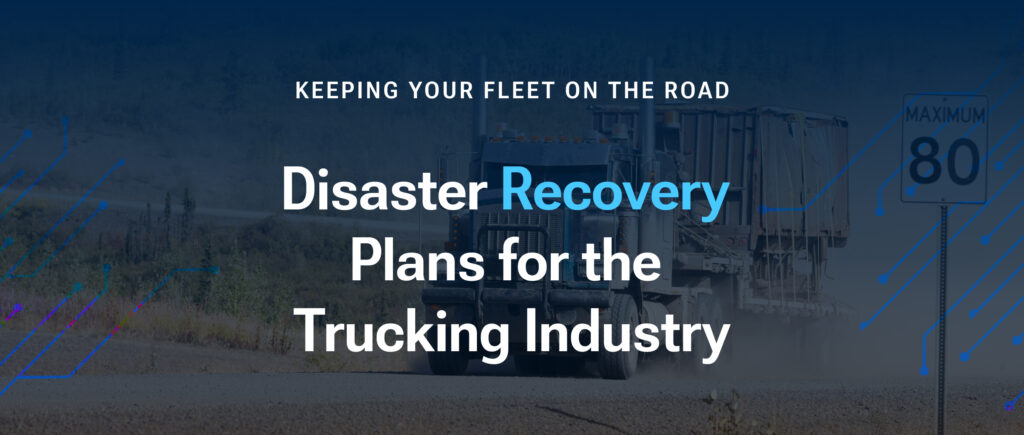In the fast-paced trucking industry, downtime can be devastating. From delivery delays to revenue loss, unexpected disruptions in operations can affect every part of the business. This is where disaster recovery plans for the trucking industry come into play. By developing a strong disaster recovery plan, trucking companies can ensure they remain operational, even in the face of system failures, cyberattacks, or natural disasters. In this blog post, we’ll discuss how disaster recovery strategies help keep fleets on the road and operations running smoothly.
Why Disaster Recovery Is Critical in Trucking
The trucking industry relies heavily on technology to manage everything from logistics and routing to payroll and fuel management. Any breakdown in these systems can cause significant disruptions. Whether it’s a data breach, a hardware failure, or an unexpected natural disaster, without a plan in place, trucking companies risk losing valuable time and money.
A disaster recovery plan helps mitigate these risks by ensuring that critical data is backed up, systems are recoverable, and operations can continue even in the most challenging circumstances. Let’s explore some of the key benefits of having a disaster recovery plan in place for your trucking business.
Key Components of a Disaster Recovery Plan for Trucking Companies
To effectively protect your trucking company, a comprehensive disaster recovery plan should include the following elements:
1. Backup Data Solutions
One of the most crucial components of any disaster recovery plan is the implementation of backup data solutions. In the trucking industry, real-time data such as route planning, vehicle tracking, and client information must be backed up regularly. Using cloud-based backup services, like those offered by Advance Network Design, ensures that your data is stored securely and can be quickly recovered if needed.
2. Cloud Services for Redundancy
Cloud services offer flexibility and redundancy, allowing companies to store data offsite. In the event of a natural disaster or cyberattack, cloud-based systems allow trucking companies to access their data from any location. Our Cloud Services provide scalable solutions to keep your fleet operating seamlessly.
3. Network Security and Cyber Threat Protection
The trucking industry is increasingly becoming a target for cyberattacks, such as ransomware. Securing your networks is vital to avoid data breaches that could halt your operations. A solid network security plan protects your company from hackers and ensures that sensitive data such as financial records, driver details, and operational schedules remain safe.
4. IT Planning and Systems Monitoring
Disaster recovery is not just about responding to crises; it’s about preventing them. Having a proactive IT planning strategy in place will help you monitor systems, identify potential issues, and reduce the risk of catastrophic failures. Managed IT services like ours offer continuous monitoring to identify system vulnerabilities before they become problems.
Managed IT Services: A Key to Successful Disaster Recovery
For many trucking companies, managing complex IT systems in-house is neither practical nor cost-effective. Partnering with a managed IT services provider ensures that your disaster recovery plan is implemented correctly and kept up to date. A managed service provider will regularly back up your data, monitor your systems, and handle any IT-related issues so you can focus on keeping your fleet moving.
At Advance Network Design, we specialize in providing comprehensive managed IT services tailored to the trucking industry. From email help and server support to disaster recovery, we help trucking companies minimize downtime and protect critical assets.
Preparing for the Unexpected: Real-Life Disaster Recovery Scenarios
Consider this scenario: A severe storm hits your company’s headquarters, flooding the offices and damaging all local servers. Without a disaster recovery plan, this would be catastrophic. However, with a cloud-based disaster recovery solution, you can immediately access backups of your data and restore your systems, allowing you to manage routes and keep your trucks on the road.
In another scenario, your company falls victim to a ransomware attack, encrypting critical business data. With a disaster recovery plan in place, you can restore unencrypted backups without paying the ransom, safeguarding your company’s finances and reputation.
Why Choose Us for Disaster Recovery Services?
At Advance Network Design, we understand that the trucking industry operates on tight deadlines and demands seamless technology solutions. Our disaster recovery plans are designed to minimize disruptions, protect critical data, and keep your fleet moving. With services such as:
- 24/7 monitoring of your systems
- Regular data backups
- Cloud services to safeguard information
- Comprehensive network security solutions
We provide the peace of mind trucking companies need to focus on what they do best—delivering goods safely and on time.
Conclusion
No matter how prepared your trucking company is, unexpected events like cyberattacks, hardware failures, or natural disasters can still occur. That’s why investing in a disaster recovery plan is essential for maintaining business continuity and protecting your operations. With a tailored plan from Advance Network Design, your trucking company will be well-positioned to face any challenge, ensuring your fleet remains on the road and your business keeps running smoothly.
Ready to secure your trucking company with a customized disaster recovery plan? Contact us today to discuss your business’s specific needs and learn more about how we can help keep your fleet on the road, no matter what.
FAQs
1. Why is disaster recovery important for trucking companies?
Disaster recovery ensures that trucking companies can quickly resume operations after disruptions such as system failures, cyberattacks, or natural disasters, minimizing downtime and revenue loss.
2. What kind of backup solutions should trucking companies use?
A combination of cloud-based and on-premise backup solutions ensures that data is protected both locally and offsite, providing fast recovery options in case of an emergency.
3. How often should I back up my trucking company’s data?
It’s best to perform daily backups of critical data, with real-time backups for essential information like routing and driver schedules.
4. What are the most common cybersecurity threats to the trucking industry?
The trucking industry is vulnerable to ransomware, phishing attacks, and data breaches, making network security and regular backups essential components of a disaster recovery plan.
5. How does a managed IT service provider help with disaster recovery?
A managed IT service provider handles everything from system monitoring and data backups to disaster recovery implementation and cybersecurity, ensuring your business remains operational during a crisis.

